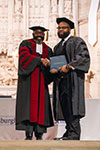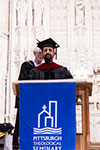Doctor of Ministry FAQs
Deciding to pursue a doctoral degree can be both exciting and intimidating. As you consider the question “Should I get a DMin?” this page may help you in your discernment. We’ve gathered some of the most frequently asked questions to help you discern whether a DMin program is a good fit for you.
WHEN DO THE NEXT DMIN COHORTS START?
We accept applications on a continuous basis for all cohorts. At this time, we anticipate starting the following foci:
- Bridging Divides: In Church, Community, and Country (June 2026)
- Christian Spirituality (June 2026)
- Creative Writing and Public Theology (June 2026)
Please note that applications are accepted on a rolling basis. Apply early, and before the priority deadline, for best consideration given a limited number of spots are available. If all spots in a particular cohort are filled, you can apply to be placed on a waitlist.
WHAT ARE THE REQUIREMENTS TO APPLY FOR A DMIN?
Application requirements include the following:
- Online Application Form
- Application Fee: $60 non-refundable; waived if you visit campus in person or virtually. Pay online
- Official Transcripts of all college, university, and graduate work attempted. (Note: PTS graduates should request transcripts from the Registrar.)
- An endorsement from the applicant’s Church Board, ecclesiastical official, or a professional supervisor when applicable approving expenditure of the time called for by the program.
- Three References: Provide name and e-mail addresses for three references (one personal, one ministerial, one academic/professional) on online application form. We can not accept references from family members.
- Essay: 1000 words describing how this particular program and cohort can equip you to live more fully into your vocational calling in your ministry context. In this essay, identify at least two authors or theological works that have inspired your continued learning and inform a potential area of research. Please note: proper citation in Chicago Manual Style is expected for this exercise.
- Personal Interview
- Background Check: Complete online; package code pi66. In lieu of the background check, applicants can also submit up-to-date clearances. PTS requires background checks for all faculty, staff, and students out of our desire to ensure the safety and well-being of all community members. The background check does not automatically disqualify someone from admission.
- If the language of instruction from prior undergraduate and graduate degrees was not English, we require TOEFL scores of at least 570 paper or 90 IBT (PTS Institutional Code is 2667). The TOEFL scores cannot be older than two years from the date the exam was taken and at the time of application.
Generally, a 3.0 GPA from an accredited M.Div. degree program is required. If you do not hold an M.Div. degree but do hold a master’s degree in an area related to your ministry setting or vocational calling, you may apply as an alternate credentials student.
The Doctor of Ministry degree is an advanced professional doctorate that builds upon an accredited master’s degree in a ministry-related area and upon significant ministry experience. Students without an accredited M.Div. degree may be admitted with alternate credentials so long as they have
- the ability to thoughtfully interpret Scripture and the theological tradition of one’s ministry context,
- the capacity to understand and adapt one’s ministry to the cultural context,
- a basic self-understanding of one’s ministerial identity and vocational calling,
- a readiness to engage in ongoing personal and spiritual formation for one’s ministry,
- an accredited master’s degree (or its educational equivalent) in an area related to one’s ministry setting or vocational calling, and
- significant ministerial experience that enables the applicant to engage as a ministry peer with other students in this advanced professional doctorate.
To receive merit or need-based aid, a financial aid application is required. See the website for more infomation.
HOW DOES THE DOCTOR OF MINISTRY PROGRAM WORK AT PITTSBURGH SEMINARY?
The purpose of the Doctor of Ministry Degree Program at Pittsburgh Theological Seminary is to engage the challenges, opportunities, and vocation of ministry through a systematic and sustained curriculum involving disciplined study and reflection over a period of three to four years. Students undertaking the degree are to develop a habit of reading and study, conversation and reflection, writing and rewriting that provides a pattern of deep theological engagement and invites renewed imagination for work in the student’s ministry setting. The program is based on a cohort model that facilitates peer relationships and shared learning throughout the D.Min. journey. Classes typically meet in two-week blocks twice per year for 2.5 years.
This emphasis on combining academic study and the practice of ministry is carried out through interactive teaching-learning styles in seminars and courses. The doctoral project at the end of coursework is undertaken under the supervision of carefully selected faculty. The project provides an opportunity for candidates to explore in-depth an aspect of their ministry to which they seek to bring new insight, knowledge, and imagination.
WHAT’S THE DIFFERENCE BETWEEN A D.MIN. AND A PH.D.?
People often wonder what makes a Doctor of Ministry different from a Ph.D. Perhaps they’re looking at doing a D.Min. or Ph.D .and want to make sure they have all the facts straight, or maybe they’re comparing the two credentials.
One of the differences is that a Ph.D. culminates in a dissertation and is primarily focused on theoretical research, which may or may not have obvious practical application. A D.Min., on the other hand, culminates in a project focused on a particular ministry context. For examples of the differences between D.Min. project and Ph.D .dissertations, see “Does the Doctor of Ministry Require a Dissertation” below.
Another difference is the time length. D.Min. programs at Pittsburgh Theological Seminary typically take three to four years. Ph.D. programs range in length and typically take at least five years.
Often, Ph.D. programs prepare students for teaching or research, whereas the D.Min. degree prepares students for deeper or more effective ministry.
Ultimately, if you’re considering a D.Min. vs Ph.D., one of the best things you can do is talk to the director of Pittsburgh Seminary’s D.Min. Program to find out which is right for you! E-mail .
DOES THE DOCTOR OF MINISTRY REQUIRE A DISSERTATION?
The D.Min. degree culminates in a final doctoral project consistent with The Association of Theological School’s standards. This project is different than other doctorate degrees which culminate in dissertations. In the Doctor of Ministry final project, each candidate demonstrates her or his ability to identify a specific theological topic in ministry, organize an effective research model, use appropriate resources, and evaluate the results, reflecting the candidate’s depth of theological insight in relation to ministry.
For example, a Ph.D. dissertation may be titled something like the following:
- “A Question of Authority: Protestants in Virginia and the Carolinas and the Tension Between Religion and Politics, 1835-1861”
- “Jesus and the Galilean Crisis: Interpretation, Reception, and History”
- “Studies in the Archaeology and History of Israelite Samaria”
- “Preaching ‘As if Nothing Had Happened’: Karl Barth’s Emergency Homiletic 1932-1933”
- “‘Newter’-ing the Nicodemite: Reception of John Calvin’s Quatre sermons (1552) in Sixteenth-Century England”
On the other hand, a D.Min. culminates in a project, typically with practical application. Here are examples of D.Min. projects:
- “Grief Recovery Ministry in the Local Church”
- “An Experiment in Reformed Revival in New Castle, Pennsylvania”
- “Missional Covenant Groups”
- “Investigating Technological Futurism's Potential Role in Humanity's Participation in Bringing About God's Renewal of the World”
Final D.Min. projects are bound and placed in Pittsburgh Seminary’s Barbour Library. Feel free to browse the theses in our catalog!
WHAT CAN I DO WITH A DOCTOR OF MINISTRY? WHAT ARE DOCTOR OF MINISTRY JOBS?
The Doctor of Ministry degree is designed to enrich and deepen the ministries of its graduates. Meet some of the DMin students and read about their varied ministry contexts.
The Rev. Dr. Andy Bossardet '23
 Andy is a minister in the Reformed Church in America, currently serving as a chaplain in the Michigan Department of Corrections. A Michigander through and through, he currently lives near Grand Rapids with his wife, Heather, and children Micah and Addison. He has been a pastor to two congregations and also worked at the denominational level building programs for leadership development and congregational health. Andy completed his Doctor of Ministry degree in the Christian Spirituality cohort at PTS in 2023. Read more about Andy.
Andy is a minister in the Reformed Church in America, currently serving as a chaplain in the Michigan Department of Corrections. A Michigander through and through, he currently lives near Grand Rapids with his wife, Heather, and children Micah and Addison. He has been a pastor to two congregations and also worked at the denominational level building programs for leadership development and congregational health. Andy completed his Doctor of Ministry degree in the Christian Spirituality cohort at PTS in 2023. Read more about Andy.
The Rev. Antonio Lawrence '25
 Antonio (pictured right) serves as pastor of Faith Presbyterian Church in Goldsboro, N.C. He loves being with people, and his sense of call is to provide a voice to the people who have no voice, providing hope to people who are trying to find hope. Antonio lives out his call as a bi-vocational pastor, serving as a behavior specialist in Goldsboro High School, where he referees sports, helps students with career planning, and sometimes just helps students get through the day by holding them as they cry. He says that he just wants to be a great disciple of Jesus, the carpenter. He is grateful for the Doctor of Ministry Program at Pittsburgh Theological Seminary as it has given him new tools for ministry in caring for his neighbors. Read more about Antonio.
Antonio (pictured right) serves as pastor of Faith Presbyterian Church in Goldsboro, N.C. He loves being with people, and his sense of call is to provide a voice to the people who have no voice, providing hope to people who are trying to find hope. Antonio lives out his call as a bi-vocational pastor, serving as a behavior specialist in Goldsboro High School, where he referees sports, helps students with career planning, and sometimes just helps students get through the day by holding them as they cry. He says that he just wants to be a great disciple of Jesus, the carpenter. He is grateful for the Doctor of Ministry Program at Pittsburgh Theological Seminary as it has given him new tools for ministry in caring for his neighbors. Read more about Antonio.
Fr. Dr. Michael Sorial '24
 Father Sorial is a priest in the Coptic Orthodox Church. A son of Egyptian immigrants, he has lived all over the United States, including Michigan, Texas, California, Tennessee, New York, and New Jersey, where he currently lives with his wife, Mora, and children, Joseph, Grace, and Elijah. He is also a co-founder and chancellor of Agora University, a pioneering, global Orthodox Christian university dedicated to building bridges between Orthodox Christianity and the humanities to address the challenges of the contemporary world via distance learning. As part of the Eastern Christian Studies cohort in the D.Min. program at PTS, Fr. Michael explored the profound and formative narrative of the Great Commission as the inspiration of an ecclesiology that embodies a life of mission for his congregation to share the gospel with their neighbors. Read more about Fr. Michael.
Father Sorial is a priest in the Coptic Orthodox Church. A son of Egyptian immigrants, he has lived all over the United States, including Michigan, Texas, California, Tennessee, New York, and New Jersey, where he currently lives with his wife, Mora, and children, Joseph, Grace, and Elijah. He is also a co-founder and chancellor of Agora University, a pioneering, global Orthodox Christian university dedicated to building bridges between Orthodox Christianity and the humanities to address the challenges of the contemporary world via distance learning. As part of the Eastern Christian Studies cohort in the D.Min. program at PTS, Fr. Michael explored the profound and formative narrative of the Great Commission as the inspiration of an ecclesiology that embodies a life of mission for his congregation to share the gospel with their neighbors. Read more about Fr. Michael.
Dr. Sharon McCart '24
 Sharon was born and raised in Southern California. After working in chemistry research and development and teaching special education, she attended Claremont School of Theology. Following in the footsteps of her father and grandfather, she became a pastor, serving a Methodist church whose congregation was 98 percent Filipino. Then, she felt called to be a deaconess in The United Methodist Church, a lay order called to ministries of love, justice, and service. With the World Council of Churches, she went on a mission trip to the Philippines (the motherland of deaconesses in Methodist church) to learn about the political situation and human rights violations there. Over many trips back to the Philippines, Sharon has developed relationships with the deaconesses in that area. In her interviews with them, she is not attempting to evangelize or colonize, but simply to listen and learn from them, asking how they persevere in such a difficult context and where they find joy in their ministry. Her final project for the doctor of ministry degree focus in creative writing and public theology is a nonfiction book with the working title "A Journey of the Heart: What I Have Learned from Deaconess/Home Missioners in the Philippines." Read more about Sharon.
Sharon was born and raised in Southern California. After working in chemistry research and development and teaching special education, she attended Claremont School of Theology. Following in the footsteps of her father and grandfather, she became a pastor, serving a Methodist church whose congregation was 98 percent Filipino. Then, she felt called to be a deaconess in The United Methodist Church, a lay order called to ministries of love, justice, and service. With the World Council of Churches, she went on a mission trip to the Philippines (the motherland of deaconesses in Methodist church) to learn about the political situation and human rights violations there. Over many trips back to the Philippines, Sharon has developed relationships with the deaconesses in that area. In her interviews with them, she is not attempting to evangelize or colonize, but simply to listen and learn from them, asking how they persevere in such a difficult context and where they find joy in their ministry. Her final project for the doctor of ministry degree focus in creative writing and public theology is a nonfiction book with the working title "A Journey of the Heart: What I Have Learned from Deaconess/Home Missioners in the Philippines." Read more about Sharon.
The Rev. Dr. Gad Mpoyo '21/'25
 Originally from the Democratic Republic of the Congo, Gad (pictured right) attended university in Zimbabwe then came to the United States to go to seminary at the Candler School of Theology. After seminary, he started Shalom International Ministries to support refugees and immigrants from Central and East Africa. In addition to serving as pastor for Shalom, he works for the 1001 New Worshiping Communities movement within the Presbyterian Church (U.S.A.). As part of the Missional Leadership cohort in the DMin program at PTS, Gad explored how people in communities are connected and found that as we seek the well-being of our neighbors, we find our own well-being. Read more about Gad.
Originally from the Democratic Republic of the Congo, Gad (pictured right) attended university in Zimbabwe then came to the United States to go to seminary at the Candler School of Theology. After seminary, he started Shalom International Ministries to support refugees and immigrants from Central and East Africa. In addition to serving as pastor for Shalom, he works for the 1001 New Worshiping Communities movement within the Presbyterian Church (U.S.A.). As part of the Missional Leadership cohort in the DMin program at PTS, Gad explored how people in communities are connected and found that as we seek the well-being of our neighbors, we find our own well-being. Read more about Gad.
WHAT SHOULD I LOOK FOR IN A TOP DMIN PROGRAM?
Several things are important in a D.Min. program.
- Make sure that the school where you complete the degree is well established and highly regarded.
- Be sure you are excited to work with the director of the program.
- Consider what past graduates are doing.
- Review past final projects (see examples above).
- Consider possible concentrations.
- Evaluate the cost.
Do you admit international students?
Due to the current structure of the program and F-1 Visa constraints, international students are only able to apply to the Reformed focus. Applicants from Canada are able to apply to all foci. Please reach out to for further questions about your eligibility.
